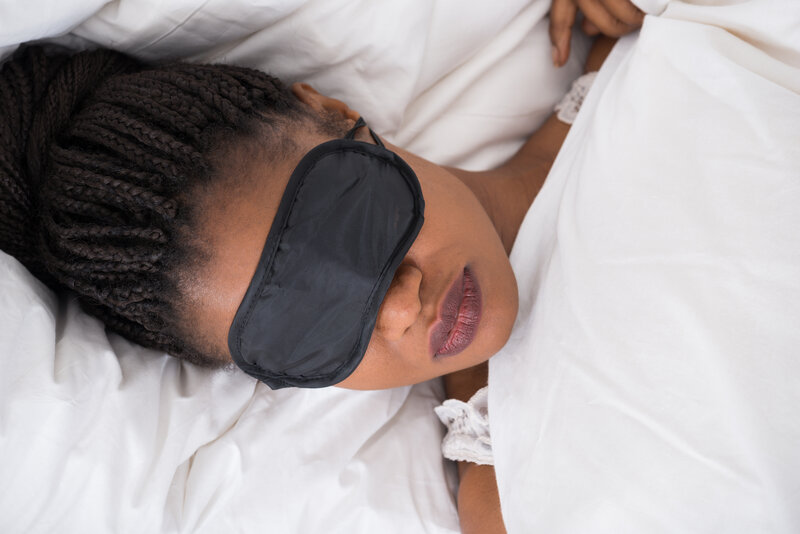Posted by: Atlantic Eye Institute in Education

Your eyes, and your vision health, are integrated parts of your entire body. The healthier your body is, the less likely you are to suffer from eye infections, diseases, or certain conditions that contribute to vision loss.
While the optometrists and ophthalmologists here at Atlantic Eye Insitute focus on the health and wellbeing of the eyes, we feel it’s equally important to emphasize healthy lifestyle choices to support that focus.
Healthy Sleep And Eye Health Go Hand In Hand
Before we launch into the benefits of healthy sleep and eye health, we also recommend visiting our post, Why Nutrition is Important for Good Vision, to learn more about how you and your family can use food as medicine for your eyes.
Sleep is equally important. Here are four ways healthy sleep improves the health of your eyes.
Immunity-Boosting
Unless there is a congenital issue, or your child has crossed eyes or a lazy eye, odds are your first encounter with an eye issue was some version of an eye infection. Pink eye is the most common, although contact lens wearers are also susceptible, as are those who swim regularly in rivers, streams, or poorly treated/monitored public pools.
Your immune system is designed to stand at attention and jump into action whenever higher-than-normal bacterial, viral, or fungal loads lead to infection. The healthier your immune system is, the less likely you are to experience infections, or the less powerful those infections will be before your immunity takes care of them.
Sleep and eye health reduce risks of dry eye
Cases of dry eye are at an all-time high, and there’s no mystery as to why. The amount of time we spend on screens at school, work, and recreationally reduces the number of times our eyes blink. Blinking is essential for bathing our eyes in cleansing and soothing tears, and the less we do it, the more our eyes dry up. However, lack of sleep also negatively impacts tear production and the risk of dry eye.
Have you ever noticed how dry your eyes feel when you’re overtired? They become scratchy, irritated, and watery. This leads to eye rubbing (also an eye care no-no!). A recent study published in the Journal of Investigative Ophthalmology & Visual Science concluded that “Short sleep duration and poor quality are both significantly and independently associated with symptoms of dry eye.”
Dry eye is caused by a lack of tear production or rapid evaporation. Tears keep the eyes consistently moistened and lubricated. However, stinging, burning, dryness, and redness will result if tears are not sufficient to keep the eyes wet and comfortable. While discomfort directly results from dry eyes, infection and corneal scarring may occur if dry eyes or tear compromised eyes are left untreated.
Getting good sleep is one way to promote healthy tear production and reduce the risk of dry eye. Other tips for reducing the chances of developing dry eye include making sure indoor humidity levels stay between 30% and 50%, using artificial tears as needed, minimizing screen time (and honoring eye breaks and blinking breaks when using screens), and minimizing the time spent wearing contact lenses.
Just say “No!” to glaucoma
Glaucoma is a leading cause of vision loss and blindness, which affects approximately 1 in 50 adults. Although it can occur at any age, the risk of developing the disease increases dramatically after the age of 35. Also, glaucoma is more likely to develop in persons with a family history of the disease, severe nearsightedness, diabetics, and in African-Americans.
There is also a link between sleeping disorders (sleep apnea, insomnia, short sleep duration) and elevated glaucoma risk. Studies have shown that adults reporting cognitive problems during the day due to sleepiness are more likely to have glaucoma-related visual field defects. Also, patients with moderate to severe obstructive sleep apnea have been shown to have a higher level of progression of their glaucoma when looking at visual field loss and retinal nerve fiber loss on OCT testing.
Reduce the risk of sleep deprivation-related accidents
Lack of sleep results in cognitive decline. In other words, every time you sleep less than 7 to 9 hours each night, or you suffer from interrupted sleep. If you don’t get enough sleep, you’re more likely to experience mental fog, fatigue, memory loss, and a tendency to drift into a daydream space. All of these put you at risk for a workplace or driving accident, elevating your chances of a traumatic eye or head injury that can cause long-term damage to your eyes or your vision.
Tips For Getting A Good Night’s Sleep
Do you struggle to get a good night’s sleep? Read the Sleep Foundation’s page about Healthy Sleep Habits for detailed instructions on how to make your bedroom a sleep oasis. Some of the most important things you can do to get a solid and uninterrupted night’s sleep include:
- Taking your contacts off every night
- Establishing consistent sleep and wake times to support your circadian rhythm
- Avoiding caffeine, alcohol, and other stimulants in the hours preceding bedtime
- Don’t eat for at least two hours before going to bed
- Stop looking at screens (TV, Tablet, Computer, Phone) to give your brain the signal that it’s time to produce melatonin
- Create a soothing bedtime ritual
If you’re doing all you can to get a good night’s sleep but still struggle to sleep well, schedule an appointment with your general physician. You may need to schedule a night or two at a sleep institute to establish the issue so it can be corrected.
And, of course, don’t forget to observe your annual eye exam. It’s the only way to catch early signs of dry eye, unnoticed corneal abrasion, or other issues that compromise your eye health and vision.
Are you overdue for your eye exam? Contact Atlantic Eye Exam and we’ll get your appointment in our calendar ASAP.



